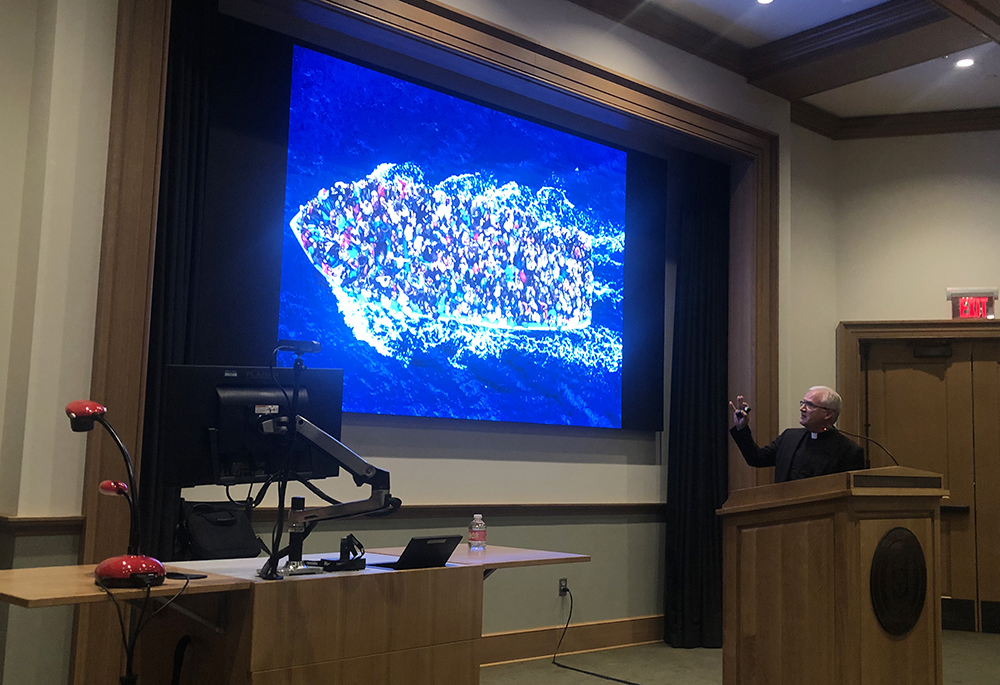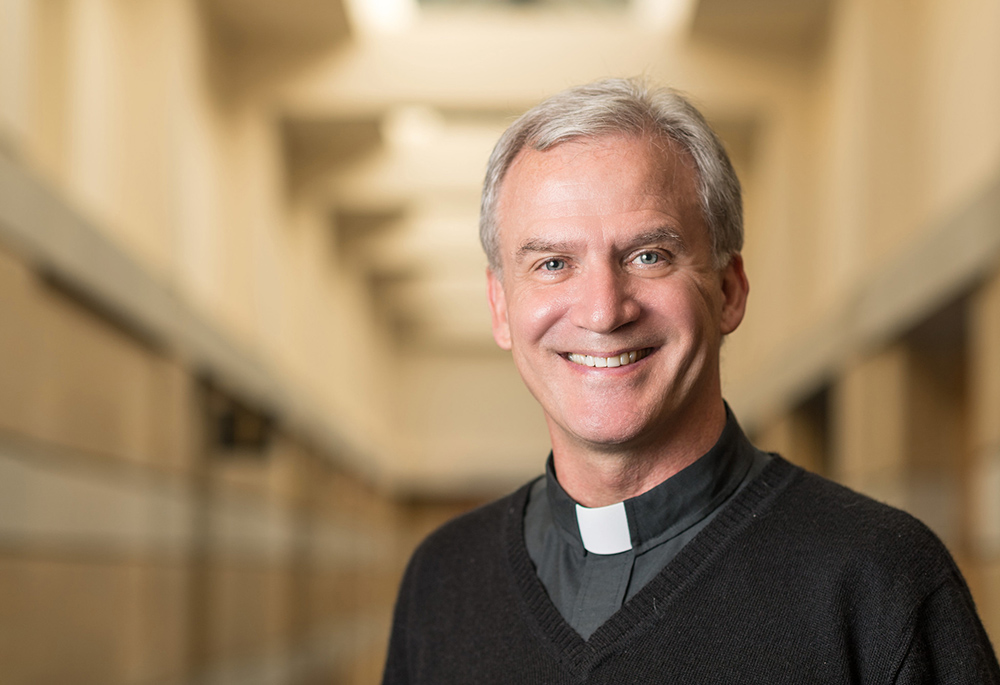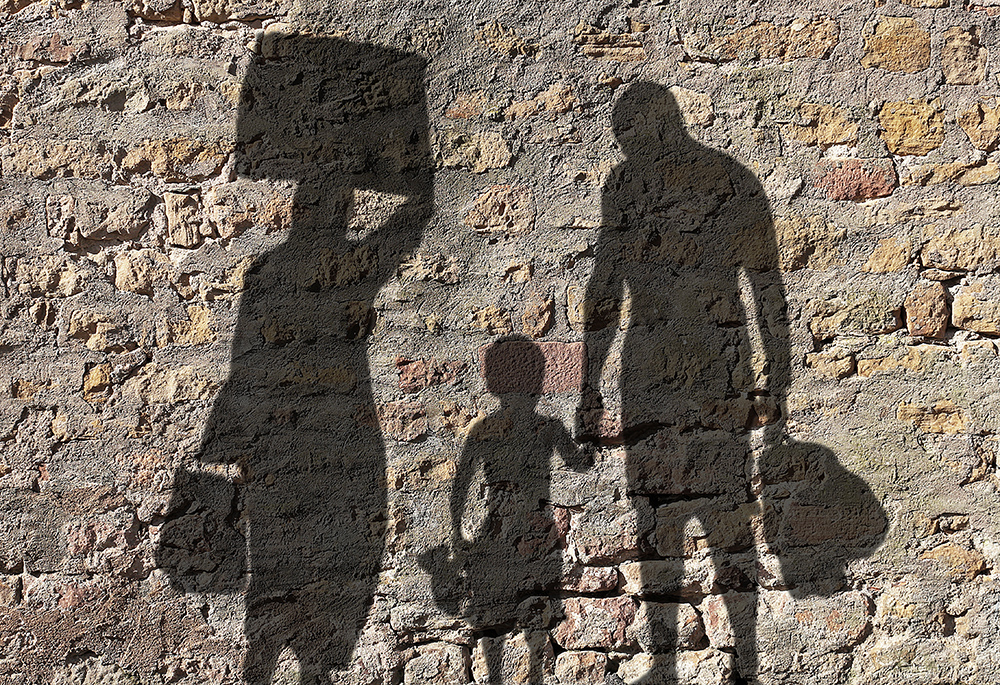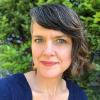
Holy Cross Fr. Dan Groody, an expert on migration and refugees, gives a talk at the University of Portland June 12. To inform his understanding of migration, Groody has traveled to some 50 countries and spoken to migrants, Border Patrol agents, nurses, politicians and bishops. (NCR photo/Katie Collins Scott)
They have crammed into baggage compartments and almost suffocated, endured days without food and faced starvation, crossed deserts and nearly died of thirst.
"All of that is hard, but it's not the worst part," said Holy Cross Fr. Dan Groody, recounting his conversations with migrants around the globe. The worst part, they tell him, is when "people treat you like you're inhuman, like you're a dog."
Groody, an expert on refugees and migration from the University of Notre Dame, gave a June 12 talk at the University of Portland in which he articulated a "theology of migration," attempting to reframe often contentious narratives through the lens of the liturgy and people's connection with God and one another.
Speaking to NCR at the end of the lecture, Groody said that, overall, Catholics need to know more about migration and where the church stands on the issue. He said the U.S. bishops — who have received vicious hate mail for their support of immigrants — can do more to address the knowledge deficit.
"But it is not just the job of the bishops," said Groody. "We all have to take our part."
Catholic Charities of Oregon, one of the state's lead resettlement agencies, organized the event.
Coincidentally the presentation was held the week after President Joe Biden, the nation's second Catholic president, issued an executive order temporarily suspending the processing of nearly all asylum claims on the southern U.S. border. Texas Gov. Greg Abbott, a fellow Catholic, last week (June 4) issued a statement that described the "invasion into our country" of immigrants without legal status in the United States.

Holy Cross Fr. Dan Groody is an administrator and professor of theology and global affairs at the University of Notre Dame in South Bend, Indiana. He has worked with Congress and the U.S. Conference of Catholic Bishops, the Vatican and the United Nations on issues of theology, globalization, migration and refugees. (Courtesy of Catholic Charities of Oregon)
The priest, an administrator and professor of theology and global affairs at Notre Dame, for his part has spent decades working and writing on migration and faith, and his 2022 book, A Theology of Migration: The Bodies of Refugees and the Body of Christ, contains a forward by Pope Francis.
In the Portland lecture Groody said migration runs through Scripture, starting with the Old Testament, when Abraham receives a call from God to leave his country, and continuing to Jesus and the apostles. As people of faith, "migration is really foundational to who we are," he said.
Groody offered a mix of theology, data — for every 100 people who apply for refugee status, only one gets it, he said — and stories drawn from conversations with everyone from migrants to Border Patrol agents to nurses to politicians.
The priest shared a photograph of four Muslim women and three young children sitting close together in a field just over the Syrian border, in Lebanon. Each woman expresses different manifestations of shock and devastation; two of the women's husbands had recently been killed, and one woman had lost her son.
"I remember when I came upon this moment, it was like encountering the Pietà in living form," said Groody, adding the photo is one example of the "human faces behind the numbers."

There currently are about 281 million migrants around the world and more than 100 million refugees, Groody said in his Portland lecture. (Courtesy of Catholic Charities of Oregon)
He also recounted a story about Francis from early in his papacy, when he visited the tiny island of Lampedusa to commemorate the thousands of migrants who had died while attempting to cross the Mediterranean Sea from North Africa.
The pope, Groody recalled, celebrated Mass using a chalice carved from the wood of a migrant vessel.
"It raised the question for me: What is the connection between that wood that was used to tell the migrant story and the story of Jesus on the cross?" said Groody. "What is the connection between migration and the Eucharist?"
Advertisement
Groody said that underneath debates about immigration are different types of perceived rights, such as sovereign rights, or the right to protect a nation and its borders; economic rights; cultural rights, "trying to defend what it means to be American"; and natural rights, "those given by God."
"So the question becomes how do these rights then interact with each other?" he said.
The priest added there's also a tension between citizenship and discipleship. "What does it mean to be members of a state but also to really go deeper than that," and to ask what are the challenges "of those who profess faith in Christ to respond to the inclusive demands of the Gospel?"
Groody proposes a "theology of migration" that ultimately says Jesus so loved the world that he died on a cross to reconcile people to God, "so that we can migrate back to our homeland."
"What God is doing in every instance," he said, "is trying to break down those walls and barriers that keep us from being connected to God and connected to one another."






